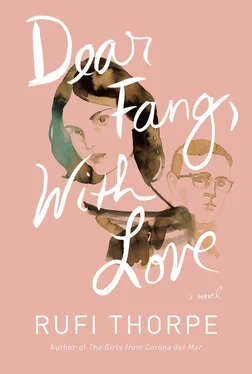I didn’t know. I didn’t know my daughter well enough to ask these things. Only to wonder as I drove the long freeways back to my empty apartment, the radio tuned to turned-down static, the window cracked, letting in the buffeting wind and the slithering nothingness of pavement flashing by.
—
Maybe I should never have taken Vera to Vilnius. It was an absurd idea, after all, whisking her off to a strange Eastern European vacation in the midst of a mental health crisis, though by that spring she was entirely stable. What worried me most was that she no longer seemed to be trying to find a way out of the maze of her depression. She had simply lain down and gone to sleep inside one of anxiety’s winding tentacle arms. I expected resistance to my Vilnius plan from Katya, from Dr. Carmichael, but everyone agreed, a little too quickly, that it might be just the thing.
I had never been there. It hadn’t even exactly occurred to me to go, not that I had ever had the opportunity to travel, really. And yet Vilnius in particular, and Lithuania in general, took up a sizable amount of mental real estate in my imagination. It was an almost mythic place to me, a kind of secret garden locked away in the heart of the world, the city they called the Jerusalem of Lithuania, the seat of a massive prewar Jewish cultural flowering.
The idea of the trip came to me in the form of a leaflet placed in my faculty mailbox. “Experience History Firsthand” it suggested in curly white script over an image of a yellow baroque cathedral. It was the kind of thing I would normally have thrown away. These days no one seemed to have even heard of Vilnius, and I liked it that way. It made me irritated to think that this leaflet had been slipped into everyone’s faculty mailbox, that just anybody who wanted to could get the idea to go there, buy a plane ticket, and “experience history firsthand.” As though that were a thing it was even possible to do.
My grandmother had been born in Vilnius, though her family was Polish. If other kids were raised on Wheaties, I was raised on stories of Grandma Sylvia. Grandma Sylvia had been sent to the Stutthof concentration camp, not because she was Jewish — we were Catholic, though by the time I was born nobody went to mass anymore — but because her father was a journalist who had openly criticized the Reich. Stutthof itself was mostly a camp for imprisonment of the Polish intelligentsia, though by 1943 it had been included in the Final Solution and a gas chamber and crematorium were added. But Grandma Sylvia managed to escape, and in an attempt to flee Germany for her native Lithuania, wound up in Poland and lived for a time with a group of rebels loosely affiliated with the Home Army in the forests outside of Warsaw. Ultimately, she never did return to Vilnius but immigrated to America after the war, where she met and married my grandfather. Together they had a family: my mother, Rose, and her brother, Toby, who died in Vietnam.
Those stories of Grandma Sylvia were the stories my mother told again and again, a prideful insistence in her voice, almost as though the stories, terrifying as they were, could be made tame by being told often enough. They were shadowy things that my mother was forcefully bringing into the light. Grandma Sylvia would never have told me such stories, and in fact any discussion of the past seemed to be weirdly off-limits in her presence, as though none of it had ever happened. My mother only knew the stories because when she was a girl, Grandma Sylvia drank, and she would get sometimes mean, sometimes sad, and whisper horrible, wet secrets as my mother rubbed her back in her dark bedroom. The stories morphed and changed, depending on Sylvia’s mood. The versions my mother told to me had been patched together through inference, guessing which of her mother’s confessions were true and which were designed to mislead.
There were many stories. There was: The Time Grandma Sylvia Escaped the Gas Chamber. The Time Grandma Sylvia Stabbed a Nazi in the Neck. The Time Grandma Sylvia Had to Kill Her Own Baby in the Woods So the Nazis Wouldn’t Hear It and Find Them. Not all of the stories were so dramatic, of course. There was also: The Time Grandma Sylvia Saved the Family by Clipping So Many Coupons the Grocer Gave Her Everything for Free. Or: The Time Grandma Sylvia Tried to Buy Rabbit Per Pound at the Pet Store.
These stories were impressed upon the soft clay of my developing mind, and they took up rather more room than my memories of the actual Grandma Sylvia. I could remember Grandma Sylvia, but only hazily. I was nine when she died, and so most of my memories of her were nothing but physical details: the ugly orange roses on her teapot; her low laugh, like gravel being shaken in a box; the pale green packets of her cigarettes, Benson & Hedges Menthol Lights; her thin wrists and papery skin that was always cut up from working in the garden; the huge sapphire ring that hung off her hand like a spider’s swollen egg sack.
There was one Grandma Sylvia story that dwarfed all of the others. It was also the only story she told openly and forthrightly, though I suspect she did it out of perversity because the story bothered her entire family.
The story was a kind of birthright, or else it was a riddle, or perhaps a curse. My mother told it to me many times over the years. In fact, there was a period when I was ten or so, just after Grandma Sylvia died, when I would request the story over and over again, and my mother always told it in the same thrilling, ritualistic way, making sure to hit on all the beloved details. The whiteness of the field of snow. The red flannel of the shirt. The bitterness of wild onions and how their leaves stuck up through the snow like scraggly hairs. The details were what made it possible to believe the story was real.
Sylvia and her sister were both in the Stutthof camp in the former territory of the Free City of Danzig. They were together, having been separated from their mother and brother before being interned. Grandma Sylvia was, my mother said, the most beautiful girl in all the world, and her sister, well, her sister was not.
On the morning Sylvia and her sister (who was always nameless, my mother claimed not to know her name) were led to the gas chamber, they knew what was coming. They weren’t confused or taken by surprise. They had known for months that the camp had been converted into a death camp; they had watched the small gas chamber being built. It was amazing how tedious and bureaucratic the process of death was. They had to wait in line to hand over their clothes to an officer, and as Sylvia handed over her clothes, the officer looked up at her like he had been stung. Such a beautiful girl! Handing over her clothes! About to die!
Sylvia and her sister held hands in the gas chamber, shivering and naked, waiting for death to begin, when suddenly the door swung open. All the naked girls looked up at the officer in astonishment. “You!” he said, and he took Sylvia. He led her naked down the hallway, took her out a back door, raped her in the snow, and then left her there. Before, in the small, crowded gas chamber, holding her sister’s hand, Sylvia had been prepared to die, had welcomed death even, but now she was already planning how to live. She sat up, naked in the snow. She thought about what she should do, scrambling up out of the snow, crouching and trying to brush it off the burning skin of her thighs. She would have simply run toward the forest, but she needed clothes and the only source of clothes was the camp. She stood frozen, undecided.
The guard returned, startling her. He threw her some good, heavy workman’s pants, men’s boots, a red flannel shirt, a jacket, and a fistful of money. “Go,” he said, gesturing at the tree line. “Run!”
She took off running across the field. She thought she’d never get across it. When she finally made it to the woods, she survived by eating wild onions she found under the snow.
Читать дальше












